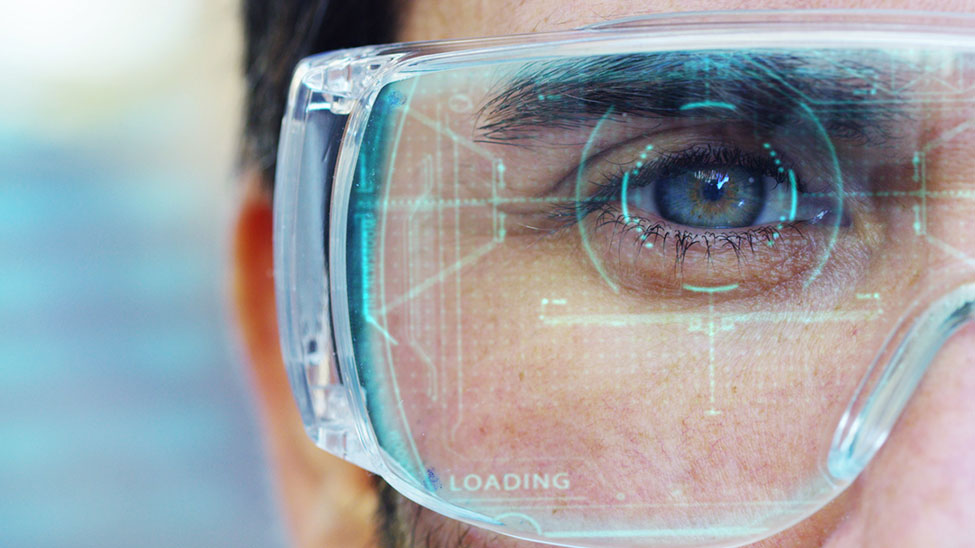Currently, there are over 1.2 million residents in United States nursing homes, and over 800,000 residents of assisted living facilities. As the Baby Boomer population ages, these numbers are projected to skyrocket—by 2050, up to 30 million people in the Americas will require long-term care services.
In other words, there are going to be a lot of people in need of quality care.
Lubin graduate students Chuk Ezuma ’23 and Rikin Gajjar ’23 spent much of the fall semester thinking about how to solve this growing problem. Through participating in the Interactive Case Competition—an emerging technology competition that featured participation from schools including NYU, the University of Maryland, Columbia Business School, just to name a few—Chuk and Rikin developed M3; a wearable product closely resembling traditional eyeglasses that leverages the metaverse to help health professionals provide efficient and effective care for the aging population.
In the world of M3, receiving quality healthcare might not even require a trip to the hospital—it could simply mean a patient can log onto Zoom or Microsoft Teams and be treated by a medical professional, who, via the use of the M3 glasses and the metaverse, will be able to communicate with patients, immediately access records, and record notes, and much more.
“We originally wanted to do something in the metaverse because it’s such a unique concept that we’re all grappling with; trying get a better understanding of the metaverse at large and figuring out ways to utilize and maximize it efficiently,” said Chuk.
“We want to save nurses time. Plus, older patients might not be able to drive, or getting to a hospital could be a headache,” said Rikin. “That’s our mission—save time and provide the best care.”
With their problem-solving concept realized, Chuk and Rikin began working on the logistics of M3. Currently, access to the metaverse is generally done through clunky virtual reality headsets, like Meta’s Quest. Chuk and Rikin’s prototype is much closer to regular, everyday glasses—believing that the combination of continuous technological advancement and research and development will make their product not only possible, but a competitive and innovative entry into the marketplace.
Employing thoughtful touches—such as a solar-powered case for doctors on-the-go, to help prevent constantly needing to charge the glasses—and figuring logistics such as payment, privacy, and HIPAA compliance, gave Chuk and Rikin a crash-course into what developing such a comprehensive product would entail.
That’s our mission—save time and provide the best care.
Presenting at the Interactive Case Competition in front of emerging technology leaders as well as graduate students from other schools, they were encouraged by the reception of M3 and were given great notes as to how to further develop the product. The experience solidified their mutual belief that the metaverse and associated “Web3” technologies are increasingly important for business students to understand, and they were thrilled to have had the opportunity to conceive and develop a product with potentially groundbreaking implications.
“It was a great learning experience, and I would recommend to other classmates,” said Rikin.
“This experience was really eye-opening,” added Chuk. “It solidified my view of entrepreneurship—taking an idea and translating it into action.”
Read More: news.google.com









 Bitcoin
Bitcoin  Ethereum
Ethereum  Tether
Tether  XRP
XRP  Solana
Solana  USDC
USDC  Dogecoin
Dogecoin  Cardano
Cardano  TRON
TRON  Lido Staked Ether
Lido Staked Ether  Wrapped Bitcoin
Wrapped Bitcoin  Hyperliquid
Hyperliquid  Sui
Sui  Wrapped stETH
Wrapped stETH  Chainlink
Chainlink  Avalanche
Avalanche  Stellar
Stellar  Shiba Inu
Shiba Inu  Bitcoin Cash
Bitcoin Cash  LEO Token
LEO Token  Hedera
Hedera  Monero
Monero  Toncoin
Toncoin  Litecoin
Litecoin  WETH
WETH  Polkadot
Polkadot  USDS
USDS  Bitget Token
Bitget Token  Wrapped eETH
Wrapped eETH  Binance Bridged USDT (BNB Smart Chain)
Binance Bridged USDT (BNB Smart Chain)  Pi Network
Pi Network  Pepe
Pepe  Ethena USDe
Ethena USDe  WhiteBIT Coin
WhiteBIT Coin  Coinbase Wrapped BTC
Coinbase Wrapped BTC  Aave
Aave  Dai
Dai  Bittensor
Bittensor  Uniswap
Uniswap  NEAR Protocol
NEAR Protocol  Aptos
Aptos  Jito Staked SOL
Jito Staked SOL  OKB
OKB  BlackRock USD Institutional Digital Liquidity Fund
BlackRock USD Institutional Digital Liquidity Fund  Ondo
Ondo  Cronos
Cronos  Ethereum Classic
Ethereum Classic  Internet Computer
Internet Computer